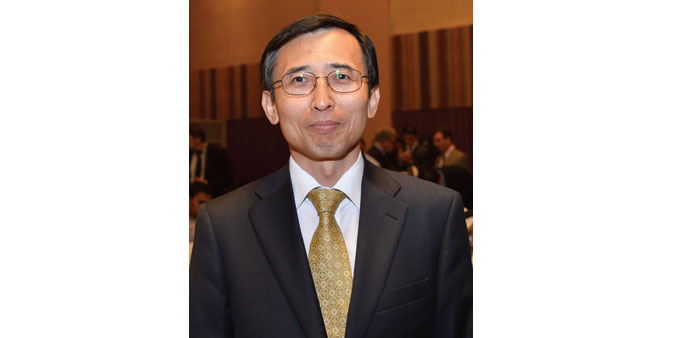By Peter Alagos
Trade volume between Qatar and South Korea reached $26.72bn in 2013, of which, Qatari exports were mainly liquefied natural gas (LNG), crude oil, and other petrochemicals, while majority of imports to Qatar consisted of electronics, automobiles, and assorted machinery.
South Korean ambassador Chung Keejong told Gulf Times that the two countries have shared “long and deep” bilateral relations since 1974 and added that the recent rise in trade volumes came in the wake of 40th anniversary of Qatar and South Korea’s diplomatic relations, which was celebrated on April 18.
“This friendly relations and co-operative ties have grown continuously on the basis of two main pillars, which are energy and construction since the establishment of diplomatic relations in 1974,” Chung said.
Trade volume recorded in 2012 slightly moved with a total of only $26.24bn. But comparing last year’s $26.72bn with the $21.21bn recorded in 2011, South Korea’s total bilateral trade with Qatar increased by 25.9%.
Similarly, South Korea’s imports from Qatar of $25.87bn in 2013 barely moved compared to the $25.5bn recorded in 2012. However, the South Korean embassy recorded a 24.7% increase by comparing last year’s statistics to the $20.74bn total imports recorded in 2011.
Most of the exports from Qatar consisted of mainly LNG and crude oil, making the country the largest LNG supplier and fifth largest oil supplier to Korea. Other exports comprised petrochemicals, polymers, and fertilisers.
On the other hand, imports to Qatar from Korea were mainly light ocean vehicles, automobiles, electronics, assorted machinery, cables, various appliances, building materials, iron products, and furniture.
Chung also said Qatar had exported more than 13mn metric tonnes of LNG to South Korea and more than 86mn barrels of oil, making the country one of South Korea’s largest energy solutions suppliers.
“In turn, most of Qatar’s LNG carriers were built by Korean shipyards,” Chung noted.
He added that there are 17 major South Korean companies that have a presence in Qatar. They are involved in several major infrastructure projects such as the construction of the new National Museum in Qatar, the Barzan offshore facilities, Lusail infrastructure, and several packages in the upcoming Doha Metro project.

